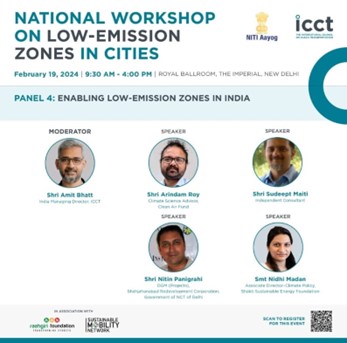The International Council on Clean Transportation (ICCT) in collaboration with Niti Ayog organised National Workshop on ‘Low Emission Zones in Cities’ on February 19, 2024, in New Delhi.

Nidhi Madan, Associate Director, Climate Policy, Shakti, participating in the panel discussion said, “Creating a compelling narrative that emphasises the simultaneous promotion of economic development and green growth is crucial when engaging with key stakeholders to implement low-emission zone solutions.”
Transportation stands out as one of the swiftest-growing contributors to global emissions, constituting the primary source of black carbon, which poses substantial threats to public health, strains economic growth, and undermines our overall well-being. Extensive research indicates that emissions from road transport significantly elevate premature mortality rates, particularly in urban locales. Recent studies emphasise the pivotal role of both electric vehicles and compact urban designs supported by transit, cycling, and walking in achieving a scenario where global warming is limited to 1.5°C. Low-emission Zones (LEZs) emerge as a potent combination of these strategies aimed at rapidly advancing transportation decarbonisation. LEZs delineate specific geographic areas within cities where the movement of polluting vehicles is regulated, alongside implementing a range of mobility measures to further curtail vehicular emissions and enhance air quality.
